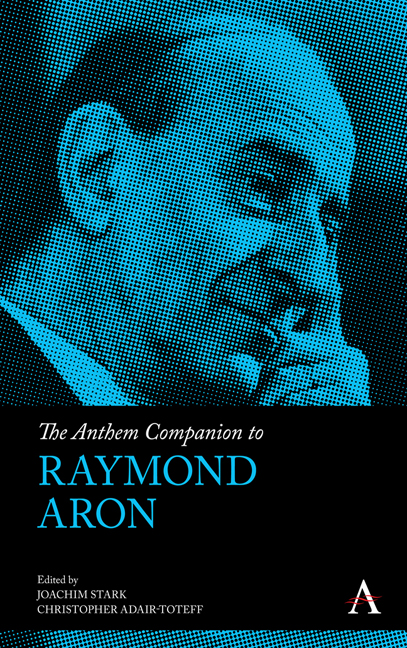Book contents
- Frontmatter
- Contents
- Acknowledgements
- Introduction: Retracing Aron’s Routes to Sociology
- Chapter One The Subject, Pluralism and Équité: Raymond Aron and Sociology
- Chapter Two Aron, Weber and Nationalism
- Chapter Three Equivocal and Inexhaustible: Aron, Marx and Marxism
- Chapter Four The Opium of the Intellectuals
- Chapter Five A New Era in the Human Adventure: Industrial Society and Economic Growth
- Chapter Six Raymond Aron: La lutte de classes
- Chapter Seven Political Philosophy Meets Political Sociology: Raymond Aron on Democracy and Totalitarianism
- Chapter Eight The Contradictions of Prometheus: Wisdom and Action after the Disillusionment of Progress
- Chapter Nine The International Problem and the Question of the Best Political Regime
- Chapter Ten War and Irrationality: Aron and Pareto
- Conclusion: Aron on Liberty
- Notes on Contributors
- Index
Conclusion: Aron on Liberty
Published online by Cambridge University Press: 22 February 2022
- Frontmatter
- Contents
- Acknowledgements
- Introduction: Retracing Aron’s Routes to Sociology
- Chapter One The Subject, Pluralism and Équité: Raymond Aron and Sociology
- Chapter Two Aron, Weber and Nationalism
- Chapter Three Equivocal and Inexhaustible: Aron, Marx and Marxism
- Chapter Four The Opium of the Intellectuals
- Chapter Five A New Era in the Human Adventure: Industrial Society and Economic Growth
- Chapter Six Raymond Aron: La lutte de classes
- Chapter Seven Political Philosophy Meets Political Sociology: Raymond Aron on Democracy and Totalitarianism
- Chapter Eight The Contradictions of Prometheus: Wisdom and Action after the Disillusionment of Progress
- Chapter Nine The International Problem and the Question of the Best Political Regime
- Chapter Ten War and Irrationality: Aron and Pareto
- Conclusion: Aron on Liberty
- Notes on Contributors
- Index
Summary
This concluding chapter has three parts: the first part is a very brief summary of the previous chapters with the intention of stressing their themes and their points of similarity. The second is a sketch regarding Aron's views on liberty. They have mostly been ignored and this second part should not be regarded as much more than a brief sketch of one of Aron's most important notions. The third is a final observation about Raymond Aron's role as a political philosopher and a social thinker. While he regarded himself as a sociologist, he was not interested very much in empirical sociology as he was in trying to learn how and why societies function in the ways that they do. Hence, he was more like Max Weber than an American sociologist. And, like Weber, he has more to tell us today than many empirical sociologists. That is not to dismiss what they do; it is just a matter of my own interests and how they align with those of Weber and Aron.
Shared Themes
As editors, Joachim Stark and I have tried to make this a true “companion” to Raymond Aron's thinking, and we have done so by attempting to cover as many aspects of his work as possible. In doing so, we found that there was some overlap and some shared themes. This was to be expected because Aron did not appear to believe that there are clear-cut boundaries between sociology, politics and philosophy. Because all of them were focused on human interactions, he regarded the differences among these disciplines as mostly artificial and more a matter of emphasis. In his Introduction as well as in the first chapter, Stark emphasized the sociological aspects of Aron's thinking, but as he noted, politics was never separate from sociology in Aron's thinking. In my chapter, I focused on Aron's relation to Max Weber, and while Aron's early work was on Weberian sociology, it was Weber's political thought that made a lasting impression on Aron's own thinking. The chapters by Scott B. Nelson and by Leslie Marsh and Nathan Cockram considered Aron's dialogue with Marx and Aron's critique of Marxist influence. Nelson and Stark focused on Aron's conception of the industrial society and how social, economic and political factors influence modern life.
- Type
- Chapter
- Information
- The Anthem Companion to Raymond Aron , pp. 189 - 196Publisher: Anthem PressPrint publication year: 2021



